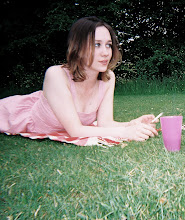JENNI FAGAN’S PANOPTICON
From Lochs to hallucinations, from mental hospitals to police vans – from “therapeutic canoeing” to the dire Children’s Panel: “The Panopticon” is an adventure through all that is most grim and entertaining about growing up in Scotland.
The novel’s anti-heroine, about to go on trial for knocking a policewoman into a coma (though she doesn’t remember if she did it because she was on ketamine at the time) runs and plots her way through life in the Panopticon, a sinister, supposedly ground-breaking care home. It’s a familiar hell.
And it is a brilliant adventure, from the start. With humour, beautifully timed writing, and intensely involving scenes of frustration and transcendence, Jenni Fagan expresses exactly what it feels like to be fifteen and growing up in Scotland. I got a particular, personal thrill, from vicariously witnessing all the crimes committed against school and police property. Those familiar, patronizing voices. Those inept police. Those dry, dead souls. They’re all here – anchored to the grim authority of the world that is just built to escape.
Fagan nails the fleeting (but seemingly eternal) grimness of childhood in the Borders. She recalls the joy of rebelling, of enduring, of running away – and also the sadness of the regular failure of that adventure. All with humour, though:
“Maybe Brendan is cement under a patio right now. What a waste, ay, he was a fucking great shoplifter.”
Of course Anais’ circumstances take boredom, misery and trauma to the extreme – but never in a way that seems unrealistic, gratuitous or exaggerated. That goes for the fantastical, hallucinatory aspect of the novel as well. The passages of grim and magical, of oppressed and let free – follow from one another naturally and consistently.
That is partly the cleverly perceived reality of being fifteen – that disconcerting sway between imagination and ground. I’m reminded of “Nausea” and “L’Etranger” more than anything. But the spirit of Jenni’s novel, of her protagonist, struck me as more victorious than either Camus or Sartre’s novels. Anais doesn’t care that there’s no God or that she feels a bit sick; she just wants a train ticket out of Scotland, rather than a tangible point to it all. The world still excites her.
And it’s that ultimate sense of optimism – of victory over this disintegrating reality – that makes the book so much fun, so accommodating and brilliant. Anais is a hell-raiser – but she is vulnerable and aware of it. She is bad, but it’s deserved. We enjoy seeing the police defeated and pathetic at this child’s hand. We enjoy the stories of school minibuses on fire and revenge by the Loch.
Perhaps we enjoy this bad behaviour in part because it is so hard not to feel close to Anais. There is a real, and sustained intimacy in this book. Sometimes childish, sometimes weary, sometimes drunk, sometimes sad. From the beginning you’re right in there – fifteen again – angry again – rebelling, once more.
“I drove [the minibus] intae the wall both times.”
“But something was different about the second time, Miss Hendricks?”
“The second time it was on fire.”
While “The Panopticon” is entertaining in its rebellion, it is also a serious book. It doesn’t shy away from anything (I don’t think I’ve ever read rape written about in such a clear and accurate way). But it remains subtle, never gratuitous or sensationalistic where it shouldn’t be.
“The Panopticon” treads just right the fine line between impassioned anarchy and elegant control. Jenni Fagan is not only victoriously, wickedly honest, but also a brilliant stylist. The words pause and tease and stop just where they should. The hallucinations fade into the ironically therapeutic Loch-side just in time. It kicks just where it should, and it’s gentle when it can be. Just when it might be getting too dark, there’s something dry, something sweet, to balance things out again. The little drags of comedy and delirium cleverly punctuate those weightier stretches.
It is so rare to read a book and to feel accepted by it, welcomed – vindicated by it, even. To be reminded of the best people you’ve met, and missed. Cathartic and nurturing, incredibly funny and victoriously escapist, there is really no doubt about it – “Panopticon” is a triumph – and an anarchic, endearing one at that.
